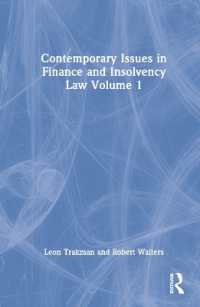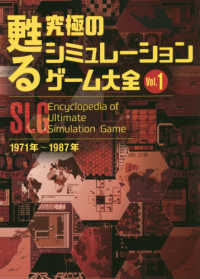- ホーム
- > 洋書
- > 英文書
- > Computer / Languages
Full Description
The four-volume set LNAI 16102 - 16105 constitutes the refereed proceedings of the 14th CCF National Conference on Natural Language Processing and Chinese Computing, NLPCC 2025, held in Urumqi, China, during August 7-9, 2025.
The 152 full papers and 26 evaluation workshop papers included in these proceedings were carefully reviewed and selected from 505 submissions. They were focused on the following topical sections:
Part I : Information Extraction and Knowledge Graph & Large Language Models and Agents.
Part II : Multimodality and Explainability & NLP Applications / Text Mining.
Part III : IR / Dialogue Systems / Question Answering; Machine Translation and Multilinguality & Sentiment analysis / Argumentation Mining / Social Media.
Part IV : Machine Learning for NLP; Fundamentals of NLP; Summarization and Generation; Others &
Evaluation Workshop.
Contents
.- IR / Dialogue Systems / Question Answering
.- TriG-RAG: Triple-Granularity Fusion for Retrieval-Augmented Generation with Adaptive Context-Relation Balance.
.- Knowledge Distillation for Large Language Models Based on Global Keywords and Chain of Thought.
.- Exploring the Capabilities of Chinese LLMs in the Legal Field.
.- RoleplayLLM: Enhancing Role-Playing Abilities in Large Language Models via Multidimensional Fine Tuning and Preference Optimization.
.- Multi-task Contrastive Learning Enhanced Instruction Tuning for Dialog Understanding.
.- DynaRAG: Adaptive Context Compression via Reinforcement Learning for Enhanced Retrieval-Augmented Generation.
.- Retrieving and Reading Multimodal Documents for Knowledge-based VQA.
.- Relation-Aware Graph Reasoning for Multiple Choice Question Answering.
.- Enhancing Depression-Diagnosis-Oriented Chat with Psychological State Tracking.
.- ReD-RAG: Rewritable Decomposition-Guided Iterative Retrieval Augmented Generation for Open Domain Multi-Hop Reasoning.
.- Bridging Questions and Charts: A Weakly Supervised Alignment Model for Chart Question Answering.
.- FRAG: Focused Retrieval Augmented Generation Reducing Retrieval Scope by Mapping Table.
.- Ensuring Context Completeness in Retrieval-Augmented Generation for Knowledge-Intensive Question-answering.
.- Machine Translation and Multilinguality
.- Improving LLM-based Document-level MT with Multi-Knowledge Fusion.
.- Continual Learning for Multilingual Neural Machine Translation via Meta-Contrastive Memory Replay.
.- Prompting and Consistency Learning Strategies for Multimodal Grammatical Error Correction in Low Error Density Domains.
.- Bias Beyond English: Evaluating Social Bias and Debiasing Methods in a Low-Resource Setting.
.- Doc-Guided Sent2Sent++: A Sent2Sent++ Agent with Doc-Guided memory for Document-level Machine Translation.
.- Fine-Grained Contrastive Learning for End-to-End Vietnamese Text Image Machine Translation.
.- Adaptive Inner Speech Text Alignment for LLM-based Speech Translation.
.- Fine-Tuning for Low-Resource Language Machine Translation Using Large Language Models Integrated with Dependency Parsing Rule.
.- Simplify Translate: A Unified Framework for Accessible Machine Translation.
.- PGATA: Phonology-and-Glyph-Aware Token Alignment for Transfer Learning in Cantonese Sarcasm Detection.
.- LLM-enhanced Translation for Low-resource Languages: Cross-lingual Alignment and Multi-domain Adaptation.
.- Sentiment analysis / Argumentation Mining / Social Media
.- Best-Fit Document: Enhancing Compositional Generalization in Multi-label Text Classification.
.- Dialogue Multi-dimensional Feature Dividing and Fusion Model for Dialogue Aspect-based Sentiment Quadruple Analysis.
.- Boosting Affective Events Classification: A Contextual Framework with Chain-of-Thought Prompt.
.- Hate Speech Detection in Somali-English Code-Switched Texts.
.- Chinese Spelling Correction for Social-Platform Internet Slang Texts.
.- DiGTF: A Difference-Guided Two-Stage Fusion Framework for Multimodal Sentiment Analysis.
.- EVL-MCoT: Enhanced Vision-Language Multi-CoT for Harmful Meme Detection.
.- Deep Graph Neural Point Process For Learning Temporal Interactive Networks.
.- Bayesian Network-based Adaptive Prompt Learning for Emotion-Cause Pair Extraction.
.- Exploring Sentiment Analysis in Tigrigna: Insights from Social Media Texts.
.- Unlocking the Advantage of Context Interaction via Bi-Graph Reasoning for Document-level Aspect-based Sentiment Analysis.
.- EMAO: Expectation-Maximization and Adaptive Objective for Microscopic Cascade Prediction.
.- Attributed Graph Clustering with Dual Contrastive Regularization.
.- Deep Learning-Based Knowledge Injection for Metaphor Detection: A Comprehensive Review.
.- CADA: A Counterfactual Adversarial Data Augmentation Framework for Low-Resource Hate Speech Detection.
.- Semantic Information Enhanced Fake News Detection.
.- Fine-grained Inappropriate Speech Detection Based on Momentum Contrastive Learning.
.- ISIPN: Intention-Semantic Incongruity Perception Network for Multimodal Metaphor Detection.
.- Self-Distillation Across Modalities: Enhancing Cross-Modal Correlation Perception for Multimodal Fake News Detection.
.- D-PathVER: Dynamic Reasoning Paths for Complex Claim Verification.
.- Dynamic Multi-Views In-Context Learning with Large Language Models for Aspect-Based Sentiment Analysis.
.- MAGI: Modality-Aligned Geometry-aware Integration for Robust Multimodal Sentiment Analysis.







